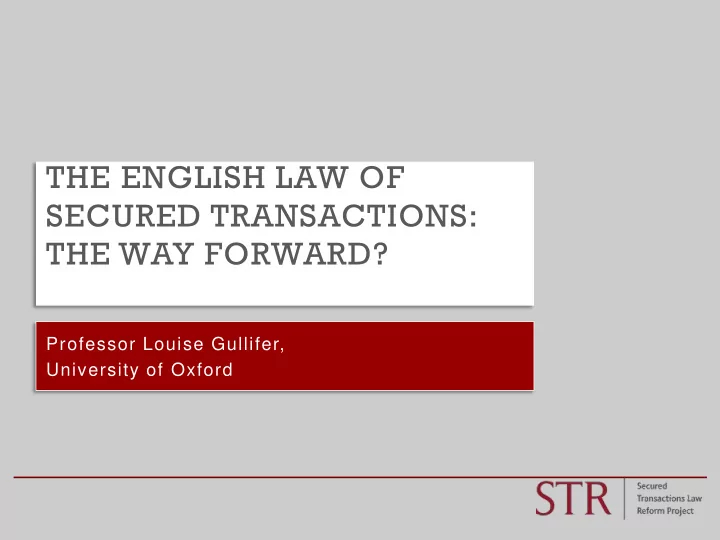

THE ENGLISH LAW OF SECURED TRANSACTIONS: THE WAY FORWARD? Professor Louise Gullifer, University of Oxford
WHAT DO WE WANT FROM A MODERN SECURED TRANSACTIONS LAW? ▪ To facilitate lending to businesses ▪ To simplify and increase the transparency of the system ▪ To enable the creation of security in a way that everyone recognises and that has consequences that are intended
WHAT QUALITIES SHOULD AN IDEAL SECURED TRANSACTIONS LAW HAVE? Clear, certain and accessible A creditor should be able to obtain security over any asset, including future assets, as cheaply as possible Transparency Clear priority rules which can be bargained round Effective enforcement whether borrower solvent or insolvent Default rules which can be contracted around, but default position should be the one most likely to be required in general, to reduce costs
WHY REFORM ENGLISH LAW? ▪ English law has several benefits, but needs to be best in class ▪ Should take advantage of innovative technology ▪ The current law is complex and hard to source ▪ Ease of doing cross-border and international business ▪ Technical problems still unresolved
SECURED TRANSACTIONS LAW REFORM PROJECT APPROACH TO REFORM Core of a modern law ▪ A simplified and codified law of secured transactions. ▪ Single concept of a (consensual) security interest. ▪ A regime which enables security to be taken over any asset, present and future. ▪ A regime of secured transactions covering security interests granted by all business debtors (corporate or non-corporate) ▪ A fully electronic system of registration, in which registration takes effect without human intervention ▪ A set of clear priority rules based on rational distinctions, including a rule that priority between registered interests is by date of registration. ▪ Effective enforcement mechanisms
AREAS FOR DEBATE Details of registration system Interaction with insolvency law (fixed/floating charges) Inclusion in regime of ▪ Outright assignments of receivables ▪ Finance leases/ HP agreements ▪ Retention of title sales Whether security interests created by consumers should be included in the same regime as those created for business purposes. Financing of particular assets eg financial collateral
REGISTRATION Document filing or notice filing? ▪ Notice filing: ▪ very brief particulars, searcher to make enquiries of registered creditor ▪ only one filing for series of transactions ▪ Document filing: ▪ upload security agreement ▪ confidentiality issues? Filing in advance ▪ Do we need it? ▪ Priority notice system if adopt document filing system
OUTRIGHT ASSIGNMENT OF RECEIVABLES No recharacterisation Options: ▪ Registration a priority point: no invalidity on insolvency for non-registration ▪ Registration a priority point + perfection: unregistered assignment void on insolvency What to register? ▪ Particulars (notice)? ▪ Document: confidentiality issues
ASSET FINANCE Options: ▪ Registration a priority point : ▪ no recharacterisation ▪ no invalidity on insolvency for unregistered interests ▪ Registration a priority point + perfection : ▪ no recharacterisation ▪ invalidity on insolvency for unregistered interests ▪ Registration a priority point + recharacterisation ▪ recharacterisation as a security interest ▪ no invalidity on insolvency for unregistered interests ▪ Registration a priority point + perfection + recharacterisation ▪ recharacterisation as a security interest ▪ invalidity on insolvency for unregistered interests
FIXED/FLOATING CHARGES ▪ Insolvency neutral. ▪ Uncertainty which potentially increases costs ▪ Uncertainty as to what amounts to operational control ▪ Affects all transactions ex ante . ▪ Replacements for ‘fixed/floating charge’ divide: US model . ▪ Priority ranking for all security interests ▪ But complex range of checks and balances on secured creditor dominance not easily replicated ▪ Replacements for ‘fixed/floating charge’ divide: PPSA model . ▪ Australia: ‘circulating assets’ ▪ New Zealand: security interests over particular types of assets. ▪ Policy options ▪ outright sales. Include all security interests (over certain types of assets) but exclude outright sales. ▪ Security interest over all assets of the borrower. ▪ In relation to either, should secured creditor be able to opt out of top-slicing by taking control. ▪ Keep the fixed/floating distinction?
TO DO LIST ▪ Interaction between registers ▪ Tacking ▪ Interaction with rules on land ▪ Private international law (jurisdictional reach and choice of law) ▪ Retention of title clauses (over inventory)/supply chain financing ▪ More work on priority notices
YOUR FEEDBACK We really value your feedback! General policy paper at https://securedtransactionslawreformproject.org/draft-policy- paper/ Detailed discussion papers at https://securedtransactionslawreformproject.org/discussion- papers/ Please get in touch: louise.gullifer@hmc.ox.ac.uk securedtransactionsproject@gmail.com
https://securedtransactionslawreformproject.org/
Recommend
More recommend